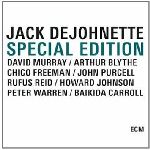social bookmarking tools:
 |
|
| Available RSS Feeds |
|---|
 - Top Picks - Top Picks |
 - Today's Music - Today's Music |
 - Editor's Blog - Editor's Blog
|
 - Articles - Articles
|
Add Louisville Music News' RSS Feed to Your Yahoo!
|
Jack DeJohnette
Special Edition Box Set (ECM 2296-99, www.ecmrecords.com)
I have to admit to having a soft spot for Jack DeJohnette. After all, he was one of the first drummers in jazz whose name I recognized (after Gene Krupa, Buddy Rich and Joe Morello). Back in 1968, he was part of the Charles Lloyd Quartet, together with Keith Jarrett and either Cecil McBee or Ron McClure on bass, and albums by this group (along with some by the Gary Burton Quartet) were the first jazz records (after Time Out) that I bought. Over the next few years, he would move on to work with Miles Davis in some of the groundbreaking electric bands, and work with a who's who of jazz luminaries, in addition to building a solo career. Jack DeJohnette turned 70 in August, and was named top drummer in the 2012 DownBeat Critics Poll. ECM has released his four albums leading his Special Edition band as a box set, sans reproductions of the color covers, but including a 13 page essay by Bradley Bambargar, complete credits, and many photos of the leader and his bandmates.
The albums, originally recorded between 1979 and 1984, are Special Edition, Tin Can Alley, Inflation Blues, and Album Album. While the lineup undergoes some changes, the overall setup was just bass and horns, with the leader sometimes overdubbing keyboards. What comes across in listening to these albums is a sense of DeJohnette's joy in blending the avant garde and tradition. Special Edition features alto saxophonist Arthur Blythe and tenor saxophonist and bass clarinetist David Murray, with bassist Peter Warren (sometimes heard on cello). A dedication to Eric Dolphy, "One for Eric," kicks things off, and the Dolphy influence is apparent in the horn playing, even without reference to the title. "Zoot Suite" is a catchy, upbeat celebration of Duke Ellington. More homages follow, in the form of a brief tone poem exploration of John Coltrane's "Central Park West," with DeJohnette forsaking his drums for melodica, and a rendition of Trane's "India," which begins with DeJohnette on piano, before he switches to drums and pushes the bass and horns to swing and sway. "Journey to the Twin Planet' is a frenetic explosion of sound, which gradually coalesces into slower textures with melodica rather than drums.
Tin Can Alley has a different front line, with Chico Freeman and John Purcell taking the places of Blythe and Murray. The opening title track is a bluesy, boppy fun piece. "Pastel Rhapsody begins with a lengthy flute duet, leading up to a piano solo, with DeJohnette's delicate cymbal work accenting this lovely ballad. "Riff Raff" mixes a swing beat and bassline with outside horn playing. "Gri Gri Man" is appropriately spooky, mostly percussion and keyboards. "I Know" calls to mind Rahsaan Roland Kirk's "Baby Let Me Shake Your Tree," with DeJohnette singing and rapping over a long R&B vamp. Inflation Blues is issued on CD for the first time. Baikida Carroll is added on trumpet, and Rufus Reid takes over on bass. "Starburst" begins with invocational playing, leading to strong interplay with the trumpet and saxophones over prominent bass, building to cacophony before coalescing into a gentle end. "Ebony" alternates jagged and smoother sections, with a delightful flute solo by Purcell. Drums and piercing trumpet introduce "The Islands," before giving way to a drum solo featuring DeJohnette's mallets and tom toms. "Inflation Blues" again features DeJohnette singing, over a reggae beat. The closing "Slowdown" lives up to its title.
The final disc, Album Album, continues DeJohnette's fusion of Afro-Caribbean and jazz rhythms and motifs. Purcell and Reid are still on board, Murray returns, and Howard Johnson's distinctive tuba and baritone sax add extra bottom. "Ahmad the Terrible," for Mr. Jamal, is a happy musical tribute, followed by Thelonious Monk's "Monk's Moods," with an expressive bass solo. "Festival" is another rollicking workout, and the expansive mood is continued in "New Orleans Strut," with DeJohnette interpolating second line rhythms. The eleven minute "Third World Anthem" provides lots of solo space, and the album concludes with a brief reworking of "Zoot Suite."
DeJohnette's decision to continue to call this group Special Edition, despite the comings and goings of some of the musicians, suggests that he saw the band as having continuity of purpose. These albums all show DeJohnette leading confidently, with much of the material having an exuberant feel. His compositions, his playing, his occasional use of new arrangements of pieces by others, all point toward an artistic vision that was not afraid of crossing genre lines within the broadest spectrum of jazz. During the time these records were cut, many were drawing lines in the sand as to what jazz should or shouldn't be. DeJohnette seems to have blithely ignored the controversy, producing music which still sounds fresh and jubilant some three decades later.

